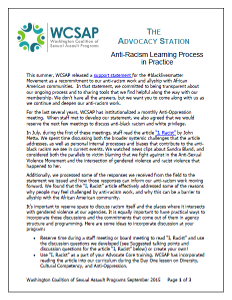Trans and nonbinary people experience disproportional rates of sexual victimization and other forms of violence. Trans people also have higher rates of disabilities than the general population. This webinar will examine the relationship between disability, trans identity and experience, and survivorship. Advocates and other providers will gain a broader understanding of the service and healing implications for survivors who live within these intersections. Participants will leave with…
- Prevention
- Working With Survivors
- Accreditation
- Advocacy Areas
- Culturally Specific
- Legal Resources
- Management
- Medical Resources
- SA Protection Order
- Subpoenas
- Support Groups
- Tech Safety
- Resources
- Policy
- Training
